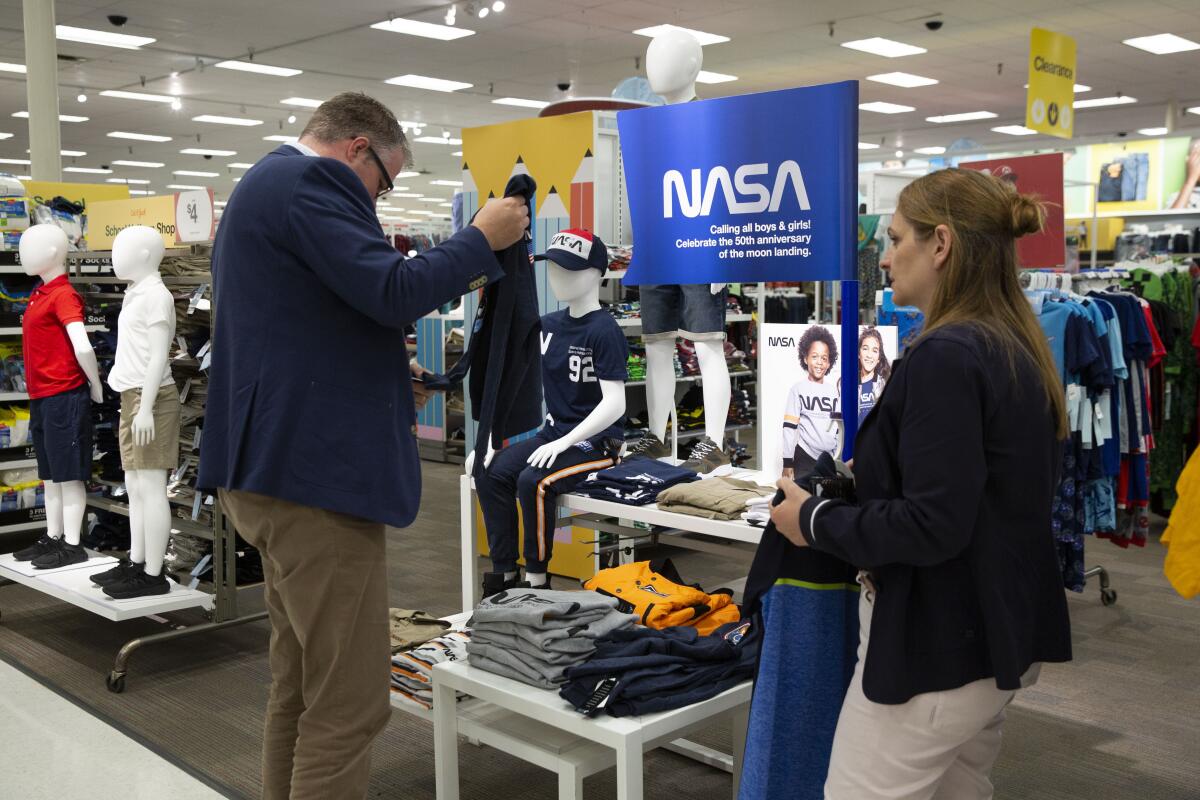The NASA logo is having a moment

- Share via
It’s the rare fashion emblem you can find everywhere.
Walmart and Target offer T-shirts, swimsuits, sippy cups and ugly Christmas sweaters covered with it. Coach put it on bags, shoes and sweatshirts priced at hundreds of dollars apiece. Singer Ariana Grande sold clothes emblazoned with it as a tie-in with her Coachella performance.
The NASA logo is having a moment.
“Very, very few brands have broad appeal,” said Utpal Dholakia, marketing professor at Rice University. “NASA fits into the mold where it not only has broad appeal, but there is almost nothing to dislike about it.”
As it did in other times of political polarization, love of the space agency brings the nation together. This affinity does not, however, bring revenue to NASA.
In keeping with its public mission, NASA doesn’t make a cent off merchandise bearing its name.
Companies need permission to use the logo, and requests have been pouring in lately. Bert Ulrich, a multimedia liaison at NASA in charge of logo approvals, said he used to get one request every week or so — until a few years ago. Now he gets more than one a day.
NASA officials and vendors say the growing demand can be traced back to the recent renewed push for education in science, technology, engineering and math. There’s also a dose of nostalgia at work.
Ulrich credits the 2017 limited-edition line of space-themed purses and apparel from Coach as a turning point. Coach asked permission to use NASA’s 1970s-designed, retro red logo type for its collection — an insignia that had not previously been approved for use on merchandise. At the time, Teen Vogue called the line “cosmically cool.”
After Coach got the go-ahead, more companies expressed interest in using that logo, and approval requests doubled, Ulrich said.
The logo featured in this line — known at NASA as “the worm” — spells out the agency’s name in three strokes that form rounded red lettering. It’s a remnant of the early shuttle era and was an attempt at a more modern look. It replaced “the meatball” — the iconic blue circle, white lettering and red, sideways V-shape that had been NASA’s insignia since the late 1950s. But the worm was short-lived, and the meatball was reinstated in 1992 as the official agency identifier.
The worm logo has a cult following in the branding and design industry, said Hamish Smyth, who co-founded the publishing house Standards Manual, which produced a coffee-table book about it.
And it taps into the childhood wonder that generations of Americans have had about space. “If you grew up in the ’80s or early ’90s or the ’70s, this logo is what NASA looks like in your mind,” Smyth said. “A lot of people, I think, were quite nostalgic for this logo.”
Last year, space enthusiast Edwin Reza, 31, bought a black T-shirt featuring the NASA meatball logo from a discount retail store. This month, he bought a similar shirt from Urban Outfitters. But he said he wouldn’t wear promotional clothing with logos from other federal agencies, at least under the current government.
NASA, though, is different. “It almost doesn’t feel like it’s part of the government, even though I know it is,” said Reza, a middle-school teacher who lives in Chino. “It has its own mythology, almost. It deals with space exploration — things that I feel the entire world could benefit from, not just our country.”
Use of federal agency logos on consumer products is not the same across the board. The National Park Service, for example, does not allow its arrowhead symbol — the brown insignia depicting a green tree, a snowy mountain and a buffalo — to be licensed for consumer merchandise.
To use either NASA logo on merchandise, companies submit designs to the agency for approval. The approval process can be as short as a few hours or as long as a couple of days, Ulrich said. This spring, he requested additional help to deal with the approval requests and now has a co-worker involved, which has been especially helpful because the 50th anniversary of the Apollo 11 moon landing has made things “quite busy,” Ulrich said.
Ulrich and his co-worker approve merchandise requests based on a few, different criteria. NASA logos cannot appear together with insignia from other brands, to avoid the perception that NASA is endorsing a specific company or product. Logo and background colors are strictly regulated and derivations of the traditional insignia — such as an item spelling out “NERD” rather than “NASA” on the meatball logo — are not permitted.
The meatball logo can never be pictured with the NASA worm because they are from two different time periods and would never have appeared together contemporaneously.
And NASA mission imagery must be used with the appropriate agency logo of the time — Apollo-era elements must be used only with the meatball logo, not the worm.
Any request involving tobacco or alcohol is denied, Ulrich said.
Beyond that, there are some subjective assessments of potential projects. The agency usually doesn’t permit underwear with NASA logos, and Ulrich said the agency recently denied a T-shirt with the NASA meatball and an illustration of astronauts in space, cheering with red cups.
“It’s just a question of how we’re perceived and how it represents us,” he said. “It’s one thing to inspire people about space exploration. But if it comes to an area ... where it has nothing to do with us, or if it’s messaging on it, we try to stay out of that too.”
NASA can send cease-and-desist letters to merchants whose NASA-branded products are out of line, but that doesn’t frequently happen with merchandise, said Jeff Heninger, senior attorney in NASA’s commercial and intellectual property law group in the office of the general counsel. At times, the conversation with violating parties can be more informal.
Recently, Heninger reached out to an online merchant selling a shirt with an eclipsed moon in the meatball logo, rather than the approved full circle. The retailer connected him with the manufacturer and the two discussed the issue.
“We don’t typically get a lot of folks that are malicious or argumentative or problematic about it,” Heninger said.
The NASA fashion trend is not lost on retailers such as Target, which has carried NASA-related merchandise — including T-shirts, socks, hats and postcards — for “many years,” company spokeswoman Courtney Foster said. Foster declined to share sales data for NASA-branded products but said they are “consistently strong and have long been a guest favorite.”
She credited the popularity of the merchandise to the sense of “adventure and intrigue” evoked by the agency’s logo.
Gift shops at NASA facilities have also benefited. Last year, Space Center Houston — the visitor center for NASA’s Johnson Space Center — saw its largest sales year since the center’s opening in 1992, said Sharon Glenn, general manager of retail operations at Space Center Houston. The visitor center’s gift shop is operated by Hudson Group, a retailer known for its stores in airports, hotels and other travel locations, and NASA does not make money from merchandise sold there. Sales at its main gift shop and its smaller kiosk on site were up 15% compared with the previous year, the company said.
Apparel, which makes up as much as 48% of sales, is one of the main drivers. The center’s bestselling apparel item is a T-shirt emblazoned with a distressed version of the meatball logo that “looks weathered,” Glenn said.
“That one is a tried and true,” she said.
To determine whether a piece of merchandise for sale at the center is a dud, Glenn described a simple test: slap a NASA logo on it.
“If it did not sell with the NASA logo on it, [the problem] was definitely the item,” she said.
More to Read
Inside the business of entertainment
The Wide Shot brings you news, analysis and insights on everything from streaming wars to production — and what it all means for the future.
You may occasionally receive promotional content from the Los Angeles Times.











